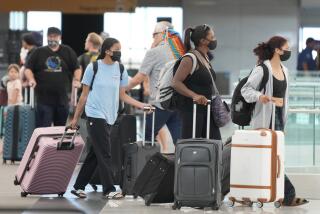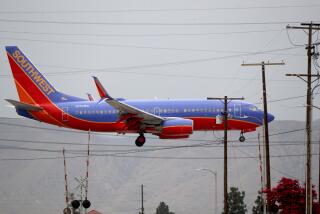Business travelers voice fear about flying on regional airlines
- Share via
Regional airlines are increasingly flying more of the nation’s commercial flights, and a new survey indicates that this unnerves many business travelers.
More than half of the nation’s scheduled commercial flights are flown by regional airlines that partner with large carriers like Delta, United and American.
The major airlines began relying more on the smaller carriers as the recession deepened. But some passengers have become increasingly worried that the smaller carriers are not as safe to fly as the large airlines.
That was a leading concern raised at a two-day hearing in Washington last week by the National Transportation Safety Board. The hearing focused on safety practices and the arrangements between the major airlines and the regional carriers.
The hearing included testimony from some family members of passengers who died in February 2009 when Colgan Air flight 3407 from New Jersey to Buffalo, N.Y., crashed, killing 50 people. Colgan was flying as a regional carrier for Continental Airlines. Federal inspectors cited pilot error as one of the causes of the crash.
During the hearing, Roger Cohen, president of the Regional Airline Assn., defended the smaller carriers, saying they adhere to the same safety standards as the big airlines. His trade group represents 31 regional airlines.
“As passengers expect, regional airlines fly under the same gold standards as the majors. There is one level of safety,” Cohen told the safety board.
But a new survey conducted by a business travel group found that 66% of corporate travel managers say the business travelers they represent have voiced fear about flying on regional carriers.
What’s more, 80% of the business travelers avoid turboprop planes primarily because of safety concerns, according to the survey of 212 corporate travel managers, travel agency executives and others by the Business Travel Coalition, a trade group in Pennsylvania.
Also, 63% of travel managers said their companies had policies that let employees avoid flying on regional air carriers even if it would cost more to book with a major airline, according to the survey.
• If you give it away, they will come.
At least that is the conclusion of an online survey that found that 95% of wireless Internet users said the offer of free Wi-Fi could influence the choice of the businesses they frequent.
The survey of 1,085 respondents by In-Stat, a Scottsdale, Ariz., marketing research company, found that 64% of Internet users said free Wi-Fi through a “hot spot” access point would definitely influence their choice of what venues to visit, and 31% said free Internet might sway that choice, depending on other factors.
“Our research shows that while revenue may not always be directly gleaned from the hot spot offering, free Wi-Fi has a significant value in bringing customers to a venue,” said Amy Cravens, a market analyst for In-Stat.
In-Stat estimates that by the end of 2010, more than 2 billion Internet connections will be made on Wi-Fi hot spots at about 319,200 venues worldwide.
It’s no wonder that the McDonald’s and Starbucks chains recently decided to give Wi-Fi away.
• East Coast newspapers have been screaming lately about a rash of bedbug complaints in New York hotels.
A former guest of the Waldorf Astoria even alleges in a lawsuit that her daughter was bitten by the tiny parasites at the historic New York hotel. The hotel denies having bedbugs.
But the folks who plan meetings for big businesses nationwide don’t seemed concerned about bedbugs, according to a recent phone survey of 50 meeting planners who arrange meetings for trade associations and large businesses.
The survey by the Knowland Group, a Virginia-based marketing consultant to the travel industry, found that 82% of meeting planners never inquire about bedbug outbreaks when booking a hotel.
In fact, bedbugs ranked last on a list of concerns for meeting planners when they booked events at a hotel, according to the survey. The top concerns among the planners were hotel location and cost. Even hotel amenities ranked as a higher concern than bedbugs.
More to Read
Inside the business of entertainment
The Wide Shot brings you news, analysis and insights on everything from streaming wars to production — and what it all means for the future.
You may occasionally receive promotional content from the Los Angeles Times.










